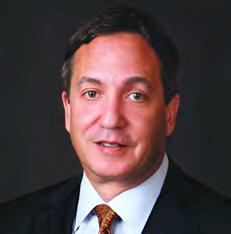
3 minute read
Lawyer Suspended For
Placing Personal Interest in Fees above Interest of Client
the clients. The clients had arranged for the sale of the entire property pending the resolution of the FDOT case.
The lawyer had a fee agreement with the clients that provided for payment by FDOT upon receiving compensation for the taken property. The agreement also contained a provision that in the event the lawyer was discharged, the clients would be responsible for the reasonable value of his services. There was a possible $8 million non-monetary benefit, involving the location of a drainage pond that the clients initially sought from FDOT. The award of such a benefit would have greatly increased the amount of fees for the lawyer.
In SC20-1685, the Florida Supreme Court suspended a lawyer for three years. The lawyer placed his personal interest in fees above the interests of his clients. In so doing, the lawyer violated a host of rules including Rule 4-1.2 (Objectives and Scope of Representation), 4-1.4 (Communication), 4-1.5 (Fees and Costs for Legal Services), 4-1.7 (Conflict of Interest), 4-3.1 (Meritorious Claims and Contentions), 4-3.4 (Fairness to Opposing Party and Counsel) and 4-8.4(d) (Misconduct).

It is often the case with serious discipline that a lawyer’s moral compass has a very different setting than the rest of the profession. Such is the situation in this case. The respondent is an example of an experienced lawyer becoming detached from his obligations to his clients and pursuing a personal interest in fees to the detriment of his clients. It was an ethical departure so obvious that it is hard to fathom. It is also a lesson to even the most experienced lawyers not to abandon the basic obligation of loyalty to clients in the pursuit of fees.
The underlying case involved eminent domain. The Florida Department of Transportation (FDOT) sought to take a portion of the property owned by is proud to announce Mark A. Haskins has joined its panel of neutrals.
The clients decided to abandon the effort to obtain the non-monetary benefit because it would delay the sale of the entire parcel. They directed the lawyer to settle the case accordingly. Instead of following the instructions of his clients, the lawyer began filing pleadings and taking actions contrary to the desires and interests of his clients. The Court stated that these actions were designed to increase fees to the lawyer. These actions also delayed the sale of the property to the detriment of the clients.
The clients hired a co-counsel who made an appearance in the case in an effort to restrain the lawyer from taking further actions to increase his fees and delay the sale. However, the lawyer continued to ignore the desires of his clients. He also filed a petition for fees in the amount of $1.3 million that sought compensation for the abandoned non-monetary benefit. The lawyer also surreptitiously altered the terms of a settlement proposal prepared by co-counsel and presented to FDOT. This act finally caused the termination of the representation of the lawyer, who then filed an unsuccessful lawsuit against his clients seeking fees.
The details of this conduct are even more egregious when the entire record is read. It provides a reminder to all practitioners that the duty of loyalty to a client should not be supplanted by the pursuit of fees.
» Working Florida Supreme Court Certified Circuit Civil Mediator for over 5 years.

» Civil litigator representing both plaintiff and defense counsel on Florida’s Southwest Gulf Coast in areas such as personal injury, complex medical malpractice, catastrophic injury, wrongful death, premises liability and commercial cases — for more than 32 years.
Mark A. Haskins
mhaskins@uww-adr.com
» Rated AV Preeminent by MartindaleHubbell.
MEDIATION | ARBITRATION | E-DISCOVERY | SPECIAL MASTERS CALL TOLL FREE: 800-264-2622

READ MORE & SCHEDULE: WWW.UWW-ADR.COM linkedin.com/company/upchurch-watson-white-&-max @UWWMmediation
Carlos represents his business clients in the areas of partner/ shareholder claims, creditors’ rights, and other contract-based claims. He represents his real estate clients in the areas of eminent domain, inverse condemnation, Bert J. Harris, Jr., Private Property Rights Protection Act claims, purchase and sale disputes, real estate broker/agent defense and landlord/tenant claims. Naples Illustrated has named Carlos a “Top Lawyer” in the practice areas of business litigation, eminent domain and condemnation law (2018-2022). Florida Super Lawyers® magazine named Carlos to their list in years 2021-2023.










